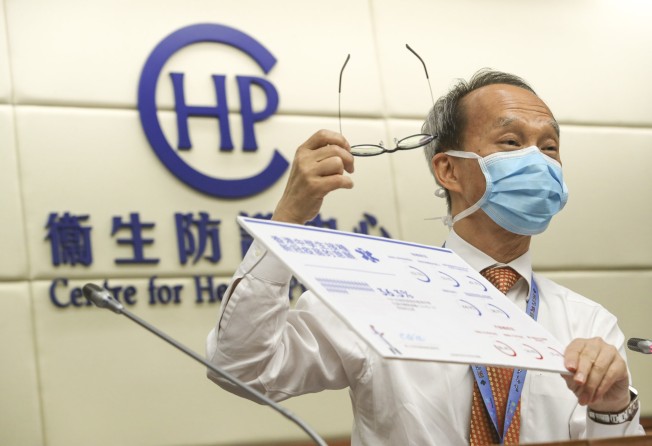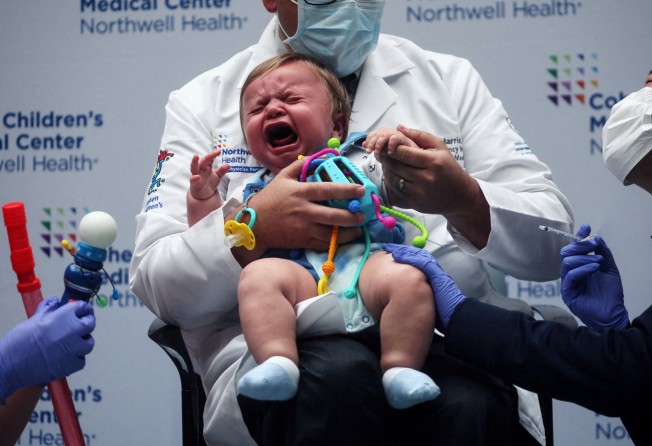
Coronavirus: Hong Kong approves Sinovac jab for toddlers as officials negotiate for BioNTech’s tailored vaccine formula
- Hong Kong becomes the first city in Asia to give approval for vaccinating children as young as six months against Covid-19
- City reports 4,123 new Covid-19 infections, including 234 imported ones, as well as 11 more related fatalities – the highest daily death toll since late April

Children aged six months to three years can receive the Sinovac Covid-19 vaccine starting on Thursday after its use was authorised by Hong Kong health officials, who are also negotiating with BioNTech for its jabs for toddlers.
The government’s decision on Tuesday came a day after two scientific committees under the Department of Health recommended that the vaccination age for children be lowered to six months, down from three years for the Sinovac jab and five years for the BioNTech version. Hong Kong will use its existing stock of the Sinovac vaccine to inoculate the children.
Authorities have yet to approve lowering the vaccination age for the BioNTech jab to six months, despite a recommendation from the two committees. Health experts have said children should receive a diluted dosage of the German-made shot, equivalent to one-tenth of that given to adults.
“The government attaches great importance to the vaccination of young children against the novel coronavirus and will try its best to provide them with multiple vaccination routes,” a spokesman said.

The decision was made because several young children had “become severely ill or even died” following infection, the government explained, citing a University of Hong Kong (HKU) study as saying those aged under 11 had a 1.8 per cent chance of requiring intensive care, and a 2 per cent mortality rate.
The government also said it would liaise with BioNTech to procure its child vaccine.
Health authorities also approved the administration of a second booster shot for those aged over 50 at least three months after they received their third dose.
Previously, the fourth jab was only recommended for those aged 18 to 59 if they were at high risk of exposure to Covid-19 or had a personal need for it, with an interval of six months after the third dose.
Hong Kong is the first city in Asia to give the green light for vaccinating children as young as six months against Covid-19. The United States, Israel, Canada and Australia are the four other countries that have done so.
On Tuesday, health officials confirmed 4,123 new Covid-19 infections, including 234 imported ones, as well as 11 more related deaths. The city’s coronavirus tally now stands at 1,358,117 cases, with 9,513 fatalities. The daily death toll was the highest since April 25, when 11 people also succumbed.
Government pandemic adviser Professor David Hui Shu-cheong said data submitted by BioNTech showed three doses of its jabs were 75.5 per cent effective in protecting against symptomatic infections for six- to 23-month-old children, with the rate rising to 82.3 for those aged two to five years.
Hui said Sinovac had not provided efficacy data but figures for its vaccine-generated antibody levels still showed they were effective.
He noted that recent data in Hong Kong showed there was a 0.14 per cent chance for children under the age of two dying or falling critically or severely ill if they contracted Covid-19, with the rate dropping to 0.11 per cent for three- to four-year-olds.
Hui said he believed the age reduction for vaccination could still protect these age groups.
Earlier in the day, Professor Lau Yu-lung, who chairs the Scientific Committee on Vaccine Preventable Diseases, said if the government failed to procure the specific BioNTech formula for toddlers, it could dilute the adult version to one-tenth of the original dose.
Lau warned, however, that there was no precedent worldwide for diluting Covid-19 vaccines for toddlers.
“Those aged up to two have a 1.5-in-1,000 chance of developing a serious condition, critical condition or even death from infection,” Lau told a radio show.
“This demographic is worth protecting to ensure we can create a favourable environment for Hong Kong to move towards normality, just like the rest of the world, by the third quarter of this year or early next year.”
Lau said the best scenario was if authorities could procure the specific formula for young children from the company. If not, he said, doctors could weigh diluting the adult formula.

The first two doses are recommended to be taken eight weeks apart, while the third should be given at least three months after the second.
“I think the biggest concern here is how to accurately dilute the one-tenth formula,” Lau said.
“A little more, and it increases the risk of some side effects. A little less, then the immunity might not be as good as expected.”
Lau noted that Hong Kong had diluted the adult formula for the BioNTech vaccine threefold to inoculate those aged between five and 11, as authorities had failed to obtain the children’s version. It is unclear why the city was unable to secure the stock for children.
As of Tuesday, 93 per cent of the population aged three or above have had one dose of a Covid-19 vaccine, with a second-jab rate of 89.6 per cent. The vaccination rate of the population aged 12 and above with three doses was 67.5 per cent while 210,159 people had received their fourth dose.